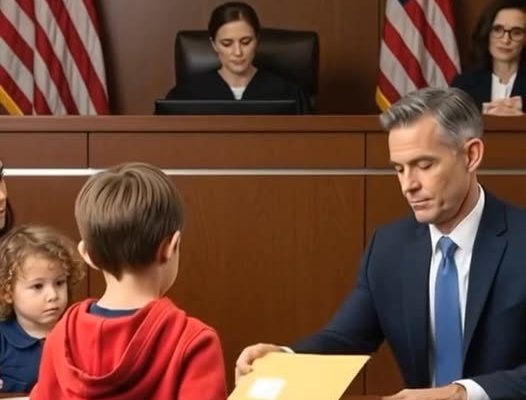I couldn’t afford a lawyer like his. I couldn’t afford anything, really. I was barely holding on. But I was there. I showed up, and I was doing everything I could for my kids.
Then, just as I felt myself slipping into that quiet panic where your body is still but your thoughts are screaming, my seven-year-old son stood up. “Mom,” he said loud enough for the courtroom to hear, “can I show the judge the letter I found in Dad’s safe?”
The room froze. Everyone turned. My ex-husband, Derek, stiffened. His lawyer blinked like she’d just been slapped. Even the judge stopped mid-sentence. I didn’t know what letter Luca meant. My heart pounded. He had never said anything about a letter. But I nodded. And as he walked toward the bench with that folded piece of paper in his small hand, everything changed.
I wasn’t always the kind of woman who sat in court afraid to speak. I used to be confident. I had a job I loved, friends, dreams that felt real. But when I married Derek, things changed slowly, and then all at once. In the beginning, he was charming, generous, convincing. He told me I didn’t need to work, that I should stay home and raise the kids while he handled the money. “You’ve done enough,” he said once. “You deserve to rest.”
I didn’t realize what I was giving up when I agreed: my independence, my voice, my safety net. After our daughter, Arya, was born, Derek started changing. He was always critical. Every dollar I spent was questioned. If I bought diapers without checking the sale price first, I got silence for hours. If I mentioned going back to work, he’d say, “We need you to be a good mom.”
By the time he left, I had nothing. No savings, no lawyer, no one in my corner except my kids. He cut off the joint account and moved in with someone new. He hired a lawyer right away. I couldn’t even afford one. I went to the free legal clinic at the county courthouse, holding a folder full of receipts and photos of my kids eating boxed macaroni on paper towels because we didn’t have clean dishes.
Our apartment was small. I worked two cleaning jobs under the table just to stay ahead of the rent. We didn’t have cable or internet. I washed my kids’ clothes by hand in the bathtub sometimes. The water heater barely worked, so I’d boil water on the stove and mix it in buckets. Luca never complained. Arya would hum little songs while I scrubbed her socks. I didn’t tell anyone how bad it got, not even my mother. I was too ashamed.
When the court date came, I was terrified. Derek had filed for full custody, claiming I was unfit, unstable, poor. His lawyer was brutal. They brought spreadsheets and photos of his beautiful home. They wore expensive suits and smiled like everything was already decided. I walked into the courtroom with a borrowed dress, a hand-me-down blazer, and a plastic folder with school records and a letter from our landlord confirming I’d never missed a payment. I knew it wasn’t enough, but I had to try. For Luca, for Arya.
That morning, Luca held my hand as we walked up the courthouse steps. “Is it going to be okay?” he asked.
I smiled, but it felt thin. “Yes, baby. It’s going to be okay.” But I wasn’t sure of anything.
Inside the courtroom, I sat straight and still. I watched Derek avoid eye contact. I listened as his lawyer, Carlaine, listed off everything I didn’t have: money, stable housing, reliable transportation. “Her son wears secondhand shoes with holes,” she said. “Her daughter’s teacher says she sometimes skips breakfast. This isn’t neglect; this is poverty. And poverty isn’t a crime, but it is a risk.”
I wanted to scream. I wanted to ask, “Where were you when I was skipping dinner to make sure there was enough cereal left? Where were you when I was selling my wedding ring to buy coats for the winter?” But I stayed silent. I had learned that in court, anger doesn’t look like strength; it looks like instability.
The judge nodded slowly, as if every accusation made perfect sense. My heart sank. And just when I felt like I might not make it, I felt that little tug on my sleeve. Luca, my sweet, brave boy. He looked up at me with wide eyes and whispered, “Mom, can I say something to the judge?”
The moment the judge spoke those words, “Would you like to explain this, Mr. Maro?” the temperature in the courtroom seemed to shift. Derek’s eyes widened. He opened his mouth but said nothing.
The judge held the letter in both hands. Then he read it aloud. “To Derek Maro from Elbecker, CPA. Subject: Strategic Financial Shielding, Divorce Prep.” He paused, glancing around the courtroom. “This is a financial strategy letter dated three months before your divorce was filed. It details instructions for opening offshore accounts, transferring assets to shell LLCs, and minimizing reported income in order to influence custody and support proceedings. It includes the line, quote, ‘Keep primary custody if possible, but at minimum ensure she has little ground for legal appeal by appearing financially stable and morally sound.’”
He stopped reading. The silence in the courtroom wasn’t just quiet; it was suffocating. Every eye was now on Derek. Even Carlaine looked stunned.
I was frozen between disbelief and a kind of quiet rage. I knew Derek was strategic and cold, but to see it in writing, to hear a judge read it out loud in front of my children, was something I never imagined.
The judge lowered the letter. “You were intentionally misleading this court,” he said, his voice sharp. “You’ve attempted to manipulate the outcome of these proceedings through financial deception.”
Derek stood up abruptly. “That letter is old! It wasn’t used!”
“Sit down, Mr. Maro,” the judge snapped. He turned his attention back to me. “Ms. Maro, were you aware of this letter before today?”
“No, Your Honor,” I said. “This is the first time I’ve seen or heard of it.”



